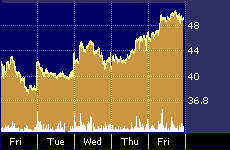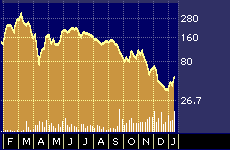
Aether Systems Inc. Soars Again
Aether Systems Inc. Soars Again
By Hal Plotkin
CNBC.com Silicon Valley Correspondent
Jan 22, 2001 08:00 AM

Aether Systems 5-day stock performance
You can add Aether Systems Inc. {AETH} to the list of technology stocks posting double-digit gains over just a few trading sessions.
But unlike Microsoft Corp.’s {MSFT} newly revived stock, Aether’s stock, which rose more than 30% last week, came off the mat, despite losses that are expected to continue at least through 2001.
Seems a bit like old times.
Aether’s stock was helped along by an analyst upgrade that came on the heels of several important customer wins for the company’s wireless-data technology.
No one is calling for the stock to regain or even approach its previous highs anytime soon, notwithstanding the recent hockey stick. After all, we are talking about a stock that topped out at 345 a share briefly last year before sliding all the way back to 28 in the year-end tech carnage. But most analysts think they see a bargain at recent prices.
“$340 was nosebleed territory,” says Rob Sanderson, an analyst at Banc of America Securities, based in San Francisco. “But we liked the stock when it was in the $100 to $140 range. At these prices we think the risk/reward ratio is now very attractive.”
Sanderson and his colleague Brian Blair upgraded Aether’s stock to “strong buy” from “buy” earlier this week, setting a new 12-month price target of 60.

Aether Systems 52-week stock performance
| Analyst Opinions: Aether Systems |
|
| Strong Buy | 9 |
| Buy | 9 |
| Hold | 0 |
| Sell | 0 |
| Strong Sell | 0 |
| Source: Zach’s Investment Research |
|
Several other analysts also say Aether’s recent stock price surge is more than a classic “dead cat bounce.”
Instead, Aether’s stock is on the move again, based on two factors: The company’s losses for 2001 are on track to come in significantly lower than previously forecast. And, it has a strong balance sheet, including about $850 million in cash on hand and an investment portfolio worth about another $300 million. That, says Sanderson, gives the company a per-share book value of about 24. More importantly, he says the bankroll will be enough to carry the company, unlike many still-private competitors, forward as the market for wireless enterprise software matures over the next two years.
Just 90 days ago, analysts had been forecasting that Aether would lose $8.10 a share in 2001, according to First Call Corp.’s consensus estimate. The same analysts now project the company will lose just $2.19 a share this year. The revision is based on recent customer wins and tighter financial markets that make it tougher for competitors that were slower out of the starting gate.
One question facing Aether moving forward is how the company will fare over time in the competition with firms such as InfoSpace Inc. {INSP} and Openwave Systems Inc. {OPWV}, the latter of which resulted from the recent merger of Phone.com and Software.com.
InfoSpace and Openwave Systems focus on providing wireless software infrastructure products and services primarily to large telecommunications carriers.
Aether and its more-direct competitors, such as 724 Solutions Inc. {SVNX}, by contrast, work within specific industry, or enterprise, markets, for example, by helping banks and other services firms offer wireless options to their customers and employees.
Aether’s new wins include E*TRADE Group Inc. {EGRP} and Juniper Financial Corp., a privately held division of Columbus Bank and Trust Co. of Georgia.
Under the deal with Aether, E*TRADE Group customers will be able to use their wireless devices to manage their accounts online. Juniper Financial customers will be able to use them to check bank balances, pay bills and move money between accounts.
Aether has a number of other major customers in the health-care, transportation, and government sectors.
It is sort of like two teams tunneling toward the same market from different sides. Within a few years it is likely they will both be battling over the same turf, with carriers seeking to bundle wireless infrastructure support services into the product packages they provide to their business clientele. Meanwhile, Aether and 724 Solutions will be attempting to expand their footprint beyond the niches they have carved out.
Which approach will pay off?
“I don’t think it’s an either or situation,” says Charul Vyas, an analyst with International Data Corp. in Austin, Texas. “I think the carriers will be looking to partner with some of the smaller firms and that the strategy might be to purchase some of them.”
“Aether is well-positioned for strong growth, and they’ve made good acquisitions,” Vyas says. “At the end of the day, I think some of the others will dry up and blow away. But there should be room for at least three or four [companies]. I think Aether’s chances look pretty good.”
Ken Dulaney, vice president for mobile computing at Gartner, based in San Jose, Calif., agrees that Aether has done an excellent job of rapidly building a leading brand name in the emerging wireless software infrastructure industry.
But Dulaney says he does have some worries about how the company will handle growth in the years ahead, particularly since so much of its work isn’t just industry-specific but also customer-specific.
“When you get down to it, they are kind of a body shop, and it is hard for a $1 billion company to be a body shop,” Dulaney says. “At some point they’re going to need more bodies, and that could be a problem.”
But Dulaney notes that it is a problem that will also face Aether’s direct competitors, as well.
Matt Finick, an analyst at Thomas Weisel Partners in San Francisco, says that Aether’s current valuation, at about 11 times expected 2001 sales, is attractive, given that competitor 724 Solutions has recently been trading at about 17 times expected 2001 sales.
Finick says that the recent customer wins bring 36% compound annual revenue gains into range for Aether over the next five years. In turn, he says that could lead to a 20% annual share-price appreciation in Aether’s stock over that period, though likely not in a straight line.
“We think the real inflection point is the second half of 2001,” Finick adds.
In the meantime, Aether investors should, Finick says, be prepared for additional setbacks tied to the slowing economy, still-limited wireless bandwidth and the relative paucity of handheld devices able to take full advantage of emerging wireless software applications.
“But from here I still think we’re looking at doubling your money over five years,” Finick says.
That may not sound all that great to tech investors who are used to doubling their money in more like five minutes. But it does indicate that at least some beaten-down tech stocks might have what it takes put the smiles back on investors’ faces.
On the other hand, even Sanderson, who helped get the stock moving again with his upgrade earlier this week, acknowledges the damage that could be inflicted by unforeseen events.
“We see a big opportunity here for investors to get in on something that is undervalued,” Sanderson says. “But the landscape two or three years down the road is unpredictable.”
For the record, though, IDC forecasts mobile wireless e-commerce revenue, which it calls m-commerce, will grow to more than $20 billion by 2004 from less than $1 million in 1999.


